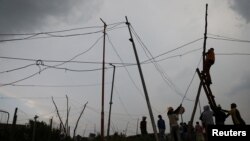Eskom, a major South African electricity provider, is asking for a government bailout, claiming it's going underwater. Fast.
Eskom Chief Financial Officer Calib Cassim says the public utility is "drowning" in debt. The life raft sought is a more than 20 percent hike in electricity rates.
"If we're not recovering it [cash] through the electricity tariff," Cassim said, "our only option then is to approach the shareholders, and [the] government, to hep deal with this shortfall."
Africa’s most industrialized economy has been suffering blackouts for 15 years. One reason is that Eskom’s old coal-fired power stations haven’t been properly maintained.
A commission of inquiry determined the chaos at Eskom was caused by the African National Congress administration of Jacob Zuma. It reported the former president appointed cronies to plunder the utility.
Eskom's pleas get a cold ear from Cape Town's mayor, Geordin Hill-Lewis, who regards the energy giant as a hole with no bottom.
“Eskom doesn’t ask government for help. It asks you and me," he said, adding "We’ve given it 150-billion-rand in bailouts over the last decade. We’ve paid 307% - before this increase – in higher prices, over the last decade. And it still doesn’t work; it’s still deep in debt..”
The nation's middle class are the ones who “bear the brunt” of soaring energy costs, said Hill-Lewis. Lower income people often don't pay their electricity bills, or get it free through illegal connections.
This cheating of the tariff, Cassim says, is a big reason why Eskom has been forced to constantly raise prices.
“We understand the economic circumstances facing the country and the economy," he says. "But government has already given us a large amount of equity injections in the recent past; 56-billion, 49-billion and 32-billion this year, including 21-billion for the next financial year, and 20-billion thereafter.”
Hill-Lewis said Eskom managers “rattle off” these numbers as if they’re nothing, yet all of this money comes from the pockets of a tiny bill-paying base.
But Cassim said no matter what happens, South Africans – already burdened by economic depression worsened by the COVID-19 pandemic – will have to pay higher rates, or see their tax dollars used to cover those bills.
“Ultimately you need to choose whether you pay for electricity directly as the consumer, or indirectly as the taxpayer," he said.




